International
Cronology of Transnational Radical Party: 1998
1 January
Italy: Rome - Antiprohibitionism
Italian Radicals dressed as Taliban hold a demonstration
outside the offices of the Italian daily L'Unità to protest against the
decision taken by the UNDCP (the UN agency responsible for drug control
activities world-wide), headed by Pino Arlacchi (who had just had an article
on this matter subject published in L'Unità), to allocate millions of
dollars to the criminal Taliban regime in Afghanistan, in exchange for
a promise to convert its opium crops, one of the main economic resources
of the region. As was to be expected, this promise would not be maintained.
12 January
EP: Strasbourg - Antiprohibitionism
Olivier Dupuis, Gianfranco Dell'Alba and Ernesto Caccavale,
among others, inaugurate a campaign to collect MEPs' signatures in support
of the d'Ancona report on drug abuse. "This report adopts a practical
approach to the problem of drugs and recommends, in particular, that we
take into account what has already been achieved through introducing measures
to decriminalise drug consumption and launching experimental programmes
involving the distribution of hard drugs under medical supervision."
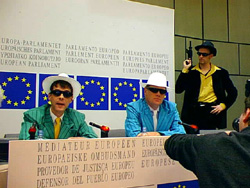 14 January
14 January
EP: Strasbourg - Antiprohibitionism
A delegation from "Mafia Incorporated" holds an ironical
press conference during which Frank Dell'Albone (Gianfranco Dell'Alba)
and Oliver Dups (Olivier Dupuis), dressed as gangsters, explain why they
would vote "against" the d'Ancona report.
15 January
EP: Strasbourg - Death Penalty
The European Parliament approves with a large majority an amendment to
the Souchet report, presented by the European Radical Alliance (ARE) group,
calling on the United States to consider the abolition of the death penalty
as an extension of the sphere of fundamental human rights, and therefore
to abolish it definitively.
20 January
Italy: Rome - Cuba, Human Rights
On the occasion of Pope John Paul II's visit to Cuba, the Radical Party
organises a torchlight vigil at the Colosseum, featuring an enormous hot-air
balloon bearing the legend: "HOLY FATHER: FREEDOM FOR CUBA, WITHOUT CASTRO".
Radical leaders and exponents take part in the protest, flanked by Cuban
dissidents such as Miriam Acevedo, Laura Gonzales (Chairwoman of the Comitato
Italiano per i Diritti Humani a Cuba - Italian Committee for Human Rights
in Cuba), and Father Miguel Angel Loredo, a Franciscan priest who was
imprisoned for 10 years in Cuba.
24 January
Italy: Verbania - Ernesto Rossi
A conference, organized by the Province of Verbano Cusio Ossola, the
Ernesto Rossi Committee and the Radical Party, under the patronage of
the President of Italy, is held at Palazzo Flaim in Verbania to celebrate
Ernesto Rossi's centenary.
30 January
Italy: Rome - Gandhi
A conference commemorating the 50th anniversary of Gandhi's death takes
place at the Italian headquarters of the Radical Party. Speakers include
Marco Pannella, Emma Bonino, the Indian Ambassador to Italy Fabian, the
Honorary President of the Radical Party Bruno Zevi, the Indian Consul
Chattopadhaya, RP Secretary Olivier Dupuis, Gandhi scholars Giuliano Pontara
and Gianni Sofri, the editor??? of Azione Nonviolenta Massimo Valpiana.
January - July
Russia: Moscow - Antiprohibitionism
The approval of an ultra-prohibitionist federal law "On Narcotic Drugs
and Psychotropic Substances" (which, among other things, prohibits the
personal use of drugs and provides for compulsory medical examinations
and obligatory therapy for drug abusers) kicks off a series of nonviolent
initiatives, including acts of civil disobedience and street surveys in
which passers-by are asked to respond to a series of questions on antiprohibitionism.
[ENG]
In July, a question concerning the constitutionality of the above law,
signed by 95 Duma members from all parliamentary groups, is presented
to the Constitutional Court. The first signatory of the question is the
Hon. Valerij Borshchev, member of the Yabloko Group and of the Transnational
Radical Party.
6 February
Senegal: Dakar - Death Penalty
The African Conference to establish the International Criminal Court
in 1998, is organized by the Radical association "No Peace Without Justice"
and the Radical Party. It is attended by delegates from all African countries,
and eminent speakers include European Commissioner Emma Bonino and the
American financier George Soros.
The final document recognises the importance of the Court for Africa and
the entire world.
19 February
EP: Strasbourg - Afghanistan
A resolution [presented by the ARE group] wholeheartedly condemning the
agreement brokered by Pino Arlacchi, on behalf of the UNDCP, with the
intolerant, fanatical Taliban regime, is adopted unanimously. The European
Parliament calls upon the Commission and Member States to closely examine
the various ways in which the agreement will be enforced, and requests
that all forms of co-operation, apart from humanitarian aid, be suspended
until the Afghan Administration respects men's and women's rights.
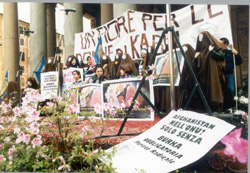 8 March
8 March
Rome, Brussels, Moscow - Afghanistan, Human Rights
On Women's Day the Radical Party, on the initiative of Emma Bonino, organises
simultaneously in Rome, Brussels and Moscow, a series of events entitled
"Un fiore per le donne di Kabul" ("A Flower for the Women of Kabul"),
in support of Afghan women, calling upon the UN and its Member States
to refuse to recognise the Taliban regime until it ceases to practise
sexual discrimination.
The event is supported by Nobel Prize-winner Rita Levi Montalcini, Minister
of Social Affairs Livia Turco, Education Under-Secretary Carla Rocchi,
Tullia Zevi, and Italian MPs Giovanna Melandri, Cristina Matranga and
Alessandra Mussolini.
12 March
EP: Strasbourg - International Criminal Court
The European Parliament unanimously approves a resolution for the establishment
of the permanent International Criminal Court, presented by all political
groups on the initiative of the ARE group and of the leader of the Liberal
Group De Vries.
The resolution calls on the European Union to adhere to the following
fundamental principles during negotiations to establish the Court:
- that an independent Prosecutor be appointed to the Court;
- that the Court's jurisdiction be extended to all capital crimes, genocide,
war crimes and crimes against humanity;
- that the Court be able to operate without being conditioned by the actions
of the UN Security Council;
- that ratification by States Parties be speeded up by the positive outcome
of the Diplomatic Conference, ie, its completing the Statute of the Court
in Rome by 17 July 1998.
16 March - 24 April
UN: Geneva - Human Rights
At the 54th Session of the UN Commission on Human Rights, the Radical
Party makes its voice heard on, among other things, the issue of conscientious
objection to military service in the Russian Federation; "Racism, Racial
Discrimination, Xenophobia and Related Intolerance" (asking for a special
report on racial discrimination against Gypsies); on the abolition of
the death penalty (through Sister Helen Prejean); on the violation of
human rights in Cuba.
Apropos of the latter, Cuban diplomats censure the Radical Party delegates,
accusing them of being in the pay of the Cuban mafia in Miami, the Sicilian
Mafia, and the secret service in various countries.
17 March
UN: Vienna - Antiprohibitionism
The Radical Party takes the floor at the UN commission charged with preparing
the special General Assembly session on the revision of the international
Conventions on drugs. The party representative points out that even the
official documents and reports produced by the UN (the latest being the
"World Report") estimate that drug trafficking accounts for 8% of world
trade, which is in itself a testimony to the disastrous results of the
current prohibitionist policies.
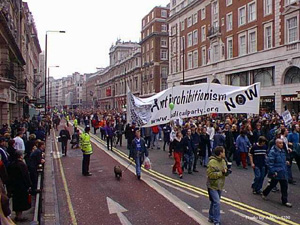 28 March
28 March
England: London - Antiprohibitionism
The Radical Party sends a delegation to the London antiprohibitionist
March from Hyde Park to Trafalgar Square, launched by the Independent
on Sunday newspaper. Marco Pannella, Olivier Dupuis and Gianfranco Dell'Alba
participate in the closing meeting.
30 March - 2 April
UNESCO: Stockholm - Esperanto
The Associazione Radicale Esperantista (Radical Esperantist Association)
takes part in the UNESCO Intergovermental Conference on Cultural Policies
for Development, in Stockholm, obtaining a formal commitment from the
Director General of UNESCO to set up a World Observatory on linguistic
policies.
The Director General is presented with over 5,000 signatures (including
those of dozens of Italian and European parliamentarians) collected by
the Association on a petition promoting Esperanto, distributed in 30 countries.
3 April
UN: Geneva - Death Penalty
Following a campaign organized by the Radical Party and the Radical league
Hands Off Cain, the UN Commission on Human Rights in Geneva approves with
an absolute majority (16 for, 13 against, 12 abstentions and 2 absentees)
a resolution for a moratorium on executions.
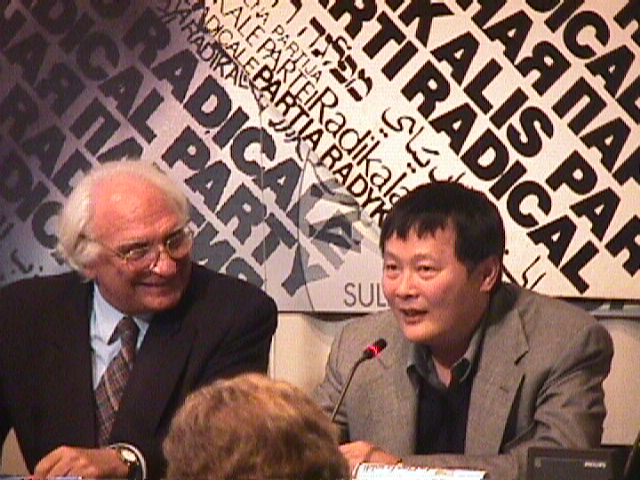 19 April
19 April
Italy: Rome - China, Human Rights
Chinese dissident Wei Jingsheng - imprisoned for 18 years in Chinese
jails and recently expelled from China - arrives in Rome, as a guest of
the Radical Party. He holds a public conference at the Party's headquarters,
meeting with, among others, the Mayor of Rome Francesco Rutelli; the Secretary
of the Democratic Left Massimo D'Alema; Achille Occhetto, and Foreign
Minister Antonio Martino. He was not received by any representative of
the government in office, however.
2 May
USA: New York - Antiprohibitionism
The Radical Party joins the "Marijuana March" in New York, to stop the
war against marijuana users that the United States has been waging for
at least 15 years. During the protest, the Radicals distribute flyers
for the legalisation of all drugs.
15 May
EP: Strasbourg - China
The European Parliament condemns, with a large majority (EPP, ARE, Greens,
Liberals and UPE "for"; PES and GUE "against") the sale of organs harvested
from condemned prisoners by the army of the People's Republic of China
and asks the Council and the Commission to undertake all the initiatives
necessary for the United Nations to set up an international commission
of inquiry without delay.
18 May
Italy - Marco Pannella
Marco Pannella undergoes heart surgery. He makes a swift recovery, but
has to have another operation on 15 June, suffering serious postoperative
complications (which make further surgery necessary) that force him to
interrupt his political activities for over a year.
2 June
China: Beijing - Human Rights
On behalf of the Radical Party, MEP Gianfranco Dell'Alba and the General
Secretary of the Radical Group at the European Parliament, Olivia Ratti,
lay nine red roses in Tienanmen Square, to commemorate the massacre carried
out there on 4 June 1989.
5-7 June
France: Paris - Antiprohibitionism
CORA holds its Congress in Paris. The final motion identifies the primary
need to "create an organized political force, capable of imposing as a
priority, at the national and international level, the reform of drug
policies and laws".
9 June
UN: New York - Antiprohibitionism
The Radical Party takes the floor at the UN Conference on Drugs and,
in open conflict with the UNDCP headed by Pino Arlacchi, denounces the
fact that all the UN international drug conventions have failed in their
attempt to curb the ever-increasing, widespread use of drugs.
11 June
Italy: Rome - International Criminal Court
An International Conference is organized by "No Peace Without Justice",
the Transnational Radical Party and the International Coalition of NGOs
for the International Criminal Court. Leading experts and advocates of
the international criminal court meet beneath an enormous poster featuring
a symbolic YES smeared with blood, created by Italian photographer Oliviero
Toscani. Speakers include the Mayor of Rome, Francesco Rutelli, ministers
Lamberto Dini and Giovanni Maria Flick, Giovanni Conso (President of the
Diplomatic Conference), the French senator and former Justice Minister
Robert Badinter, the Deputy Speaker of the Senate Domenico Contestabile,
Marco Pannella and UN representative Staffan De Mistura.
15 June
UN: Rome - International Criminal Court
The Diplomatic Conference to establish the International Criminal Court
opens at the FAO headquarters. The entire debate is broadcast live on
Radio Radicale 2 and on the Internet site: old.radicalparty.org .
18 June
EP: Strasbourg - Kosovo
An emergency resolution, promoted by the ARE (European Radical Alliance)
group is presented at the European Parliament. The resolution wholeheartedly
condemns the persistent and increasing violation of fundamental human
rights, the ethnic cleansing and the extremely violent aggressions inflicted
on the population of Kosovo by the Serb secret police, by divisions of
the army and by paramilitary forces.
19 June
EP: Strasbourg - Death Penalty
The European Parliament adopts with a very large majority a resolution
proposing that the question of a universal moratorium on executions be
placed on the agenda of the next session of the UN General Assembly, and
that a resolution requesting the introduction of such a moratorium be
presented there.
June
Azerbaijan; Armenia - Death Penalty
After a meeting with the EP delegation for relations with the Transcaucasian
Republics, Azerbaijan President, Geidar Aliev, willingly complies with
Radical Party Secretary and MEP Olivier Dupuis' request that Azerbaijan
support at the next UN General Assembly a resolution for the introduction
of a global moratorium on executions.
A few days later, during the EP delegation's visit to Armenia, Dupuis
succeeds in obtaining a similar commitment from the President of the Armenian
Republic, Robert Kotcharian, and his Foreign Minister Oskyanyan.
July
UN: Death Penalty
Ecuador, Uruguay, Venezuela, Slovakia, Malta, San Marino and Paraguay
are among the first countries to support the proposal to include the question
of a global moratorium on the agenda of the next UN General Assembly;
and, subsequently, to cosponsor a resolution for the introduction of such
a moratorium. This proposal was made by the Radical Party to over 60 countries
that sponsored the resolution adopted by the UN Commission on Human Rights,
and received the backing of forty-eight of them.
July
UN: Rome - International Criminal Court
Given the slow pace at which the work of the Diplomatic Conference to
establish the International Criminal Court is proceeding, the association
"No Peace Without Justice" presents an appeal to the Italian government
and all the other governments participating in the Conference, asking
them to take all the political and diplomatic actions necessary to accelerate
the work and to find the solutions required to establish an independent,
fair and effective Court by 17 July.
Signatories of the appeal include: Rita Levi Montalcini, Nilde Iotti,
Emma Bonino, Giovanni Leone, Silvio Berlusconi, Massimo D'Alema, Vincenzo
Caianiello, Francesco Paolo Casavola, Furio Colombo, Aldo Corasaniti,
Athos De Luca, Gianfranco Dell'Alba, Staffan De Mistura, Olivier Dupuis,
Niccolò Figà Talamanca, Luigi Manconi, Filippo Mancuso, Antonio Martino.
On 8 July, hundreds of citizens start a hunger strike in relays to achieve
the same goals.
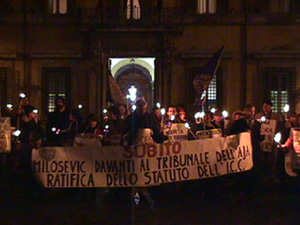 14 July
14 July
Italy: Rome - International Criminal Court
A torchlight procession, from Piazza del Campidoglio to the FAO headquarters,
is held for the immediate creation of the International Criminal Court.
Participants include: Romano Prodi (Prime Minister), Emma Bonino (European
Commissioner), Francesco Rutelli (Mayor of Rome), Alfredo Biondi (Deputy
Speaker of the Chamber of Deputies), Achille Occhetto (Chairman of the
Committee for Foreign Affairs at the Chamber of Deputies), Olivier Dupuis
(Secretary of the Radical Party), Sergio Stanzani (President of "No Peace
Without Justice", Bosnia and Herzegovina's Ambassador to the UN Mohammed
Sacirbey.
At the FAO headquarters, members of the procession presented the appeal
"NO EXCUSES, NO ALIBIS" to the President of the Diplomatic Conference,
Giovanni Conso.
On 16 July, a speech marathon and vigil begins outside the FAO building.
17 July
EP: Strasbourg - Vietnam
For the first time, the European Parliament approves a resolution, presented
by the European Radical Alliance group, condemning the gross violations
of human rights in Vietnam, and calls on the Vietnamese authorities to
rapidly establish the rule of law and proceed with reforms.
18 July
UN: Rome - International Criminal Court
The Diplomatic Conference establishes the International Criminal Court
by approving the Statute.
As far as the Radical Party is concerned "it may not be a perfect document,
but the permanent Court is a real step forward in the reform of international
law and international institutions. (...) Another important Radical achievement
is the exclusion of the death penalty from the Statute".
6 August
Incrimination of Milosevic
The Radical Party launches an international campaign to collect signatures
on a petition addressed to the President and the Prosecutor of the International
Tribunal for the Former Yugoslavia, asking that Serb President Slobodan
Milosevic be charged with genocide and crimes against humanity.
"We must bring down the National Communist regime in Belgrade. We must
stop the Belgrade regime's aggression in Kosovo. We must give Serbs a
chance to rebuild democracy and to reinstate the rule of law in their
country. Therefore, we must stop President Milosevic."
In just a few months the petition is signed by more than 51,000 citizens
of different nationalities, including hundreds of parliamentarians, men
of government, university dons and personalities. Among the most well-known
are: Michel Rocard, Leo Tindemans, Otto Von Habsburg, Achille Occhetto,
David Martin, Wilfried Martens, Antoinette Spaak, Adem Demaci, André Glucksman,
Bianca Jagger, Ismail Kadare, Isabelle Adjani, Antonino Zichichi, Marie-Claire
Mendes-France, John Polanyi.
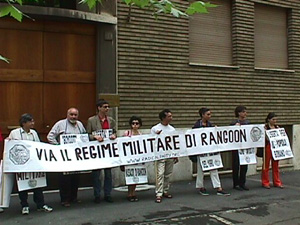 8 August
8 August
Italy: Rome - Burma (now Myanmar)
On the 10th anniversary of the violent repression of the civil population
of Rangoon by the police force of the Burmese military junta (SLORC),
the Radical Party demonstrates outside the Burmese Embassy in Rome.
Slogans: "Free the Burmese people"; "Free Aung San Suu Kyi"; "Stand by
the 1990 election results"; "Boycott the Rangoon regime".
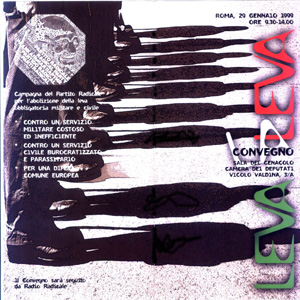 August
August
Italy: Rome - National Service
A press conference is held at the Radical Party's Rome headquarters to
launch the campaign "LEVA LA LEVA" ("ABOLISH NATIONAL SERVICE"), organized
by the Né Giusta, Né Utile (Neither Fair, Nor Useful) Committee and the
Radical Party, to abolish compulsory national and civilian service. The
text of a popular petition, on which signatures are about to be collected,
is read during the Conference. The aim of this petition is "to radically
question Italy's costly, inefficient military service structure and that
of a bureaucratic, civilian service network rife with favouritism."
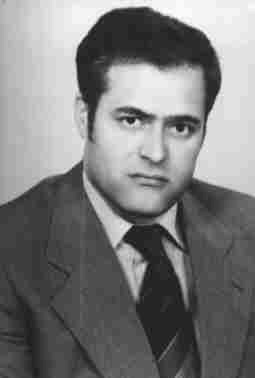 9 September
9 September
EP: Strasbourg - Kosovo
The ARE (European Radical Alliance) group and about a dozen MEPs from
other groups present their candidate for the 1999 Sakharov Prize for "freedom
of thought": Professor Ukshin Hoti, Professor of Political Science at
the University of Pristina, who spent 8 years in prison for crimes of
opinion as a result of his militancy in favour of a nonviolent, negotiated
solution to the Kosovo situation.
His candidacy is seconded by many politicians and intellectuals, including
Adem Demaci (1991 Sakharov Prize-winner and a leading figure on the Kosovar
political scene); Bujar Dugolli, President of the Student's Union at the
University of Pristina; and the Albanian writer Ismail Kadare.
6 October
EP: Strasbourg - Antiprohibitionism
The European Parliament approves the d'Ancona report on drugs, but only
after it has been revised and amended several times, following a compromise
between the Socialist and Popular groups. Despite the fact that the report
takes up the most advanced "harm reduction" policies and recommends their
widespread application, antiprohibitionist MEPs Olivier Dupuis and Gianfranco
Dell'Alba vote against it, finding it impossible to "support a text that
makes a moralistic appeal for a 'society without drugs' instead of fighting
a prohibitionist system (with an annual turnover of 400 billion dollars,
amounting to 8% of annual world trade) and its terrible consequences in
terms of the destruction of the rule of law, legal economies, and the
judiciary, political, police and journalistic structures in producer as
well as consumer countries".
8 October
EP: Strasbourg - Kosovo
After a heated debate, the European Parliament adopts a resolution calling
on the Council of Member States of the European Union to do everything
in its power to have President Milosevic incriminated for crimes against
humanity and warcrimes, by the Tribunal in The Hague.
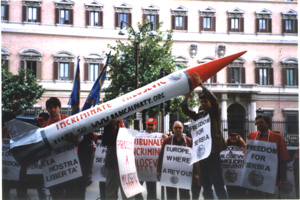 10 October
10 October
Italy : Rome - Incrimination of Milosevic
On the eve of NATO military intervention in Kosovo, the Radical Party
holds a demonstration to have Serb President Milosevic incriminated by
the Tribunal in The Hague. An enormous papier-mâché missile on the side
of which is written "Incriminate Milosevic" indicates that this would
be the most effective way for the international community and the Member
States of NATO to stop the tragedy in Kosovo.
27 October
Italy: Rome - Pedophilia
A Conference entitled "Pedophilia and the Internet" is organized in Rome
by the Radical Party and Radio Radicale. The Conference to fiercely questions
the new law against the sexual exploitation of minors (which it is feared
"may be used as a pretext to restrict individual liberties and to justify
the ever-increasing methods of controlling society") and the "political,
journalistic and legal crusade" against the Internet, which is accused
of welcoming pedophiles.
Among the personalities who speak at the Conference are the Head of the
CENSIS (Centro Studi Investimenti Sociali) Giuseppe De Rita, Italian MP
Marco Taradash, the writer Barbara Alberti, the President of the Italian
Association of Internet Providers Marco Barbuti, the psychoanalyst Aldo
Carotentuo and RP Secretary Olivier Dupuis.
30 October
Albania: Tirana - Incrimination of Milosevic
Olivier Dupuis meets with incoming Albanian Prime Minister Pandeli Majko,
who has been a member of the Radical Party for 6 years, and Sali Berisha,
President of the Albanian Democratic Party and former President of the
Republic of Albania. They discuss, among other things, the campaign to
incriminate Milosevic at the Tribunal in The Hague, which Majko was not
only to second but also promote.
[FOTO DI MAJKO]
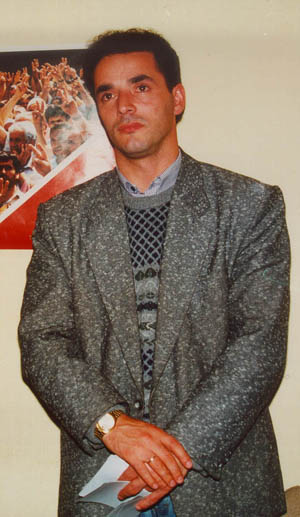 November
November
EP: Strasbourg - Kosovo
MEPs Olivier Dupuis and Gianfranco Dell'Alba present a resolution on
behalf of the ARE group, asking that two political representatives of
the Albanian minority in Macedonia be freed: Alajdin Demiri, Mayor of
Tetovo, and Rufi Osmani, Mayor of Gostivar, both of whom were sentenced
in 1997 to several years in prison for having demonstrated against the
ban on raising the Albanian flag in a public place. The Macedonian Parliament
would grant amnesty to both men at the end of December.
2 November
Italy: Turin - Incrimination of Milosevic
The Turin City Council approves with a large majority an agenda (opposed
by the Refounded Communists and the Italian Communists), presented by
Greens councillor Silvio Viale (member of the Radical Party), on the situation
in Kosovo and for the incrimination of the President of the Federal Republic
of Yugoslavia Slobodan Milosevic by the International Tribunal in The
Hague.
Turin is the first major European city to back the indictment of Milosevic.
November
Russia: Moscow
Galina Starovojtova is murdered in Moscow. A member of the Duma and of
the Associazione Radicale Antimilitarista, she fought untiringly in many
Radical Party battles, from the campaign to indict Slobodan Milosevic
to antiprohibitionism and the defence of human rights in China.
November
Italy : Rome - Congo, Human Rights
During the Rome visit of the President of the Congo Laurent-Désiré Kabila,
strongly suspected of ordering massacres on a unimaginable scale, a Radical
activist, Alexandre De Perlinghi, is attacked by Kabila's bodyguards for
having shouted at the President : "Murderer! Murderer! You should be standing
trial!"
Two days later Radical militants demonstrate in Piazza del Quirinale while
Kabila meets with the then President Oscar Luigi Scalfaro.
Slogans: "Kabila should be in court, not at the Quirinal Palace, "Democracy
in Africa".
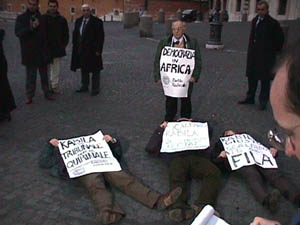 10 December
10 December
Italy: Rome - International Criminal Court
On the 50th Anniversary of the Universal Declaration of Human Rights,
the Radical Party organises a torchlight vigil in Piazza Montecitorio
to ask the Italian Parliament to approve immediately the Law of Ratification
of the Statute for the establishment of the permanent International Criminal
Court; to request that the Government undertake all the initiatives necessary
for the International Tribunal for crimes committed in the Former Yugoslavia
to operate freely in Kosovo; and to ensure that EU policy in the region
focuses on the re-establishment of democracy in Serbia and of freedom
in Kosovo.
December
Italy: Rome - Iraq
Radicals demonstrate outside the American Embassy in Rome as a gesture
of solidarity towards Clinton and Blair during the Anglo-American military
intervention in Iraq, aimed at restoring international legality. Militants
from the right-leaning Italian MSI party (Movimento Sociale Italiano)
attack the Radicals.
The next day, a similar demonstration is held in front of the seat of
the Italian Government.
December
Italy: Rome - Death Penalty
A Christmas March from Campo de' Fiori to St. Peter's is organised by
the Radical association Hands Off Cain and the Radical Party, with a view
to obtaining a global moratorium on executions. Marchers include over
100 mayors and representatives of regions and provinces, representatives
of many political parties, and leading figures from various voluntary
associations and international organisations. The Pope declares in his
Christmas message that he is against capital punishment.